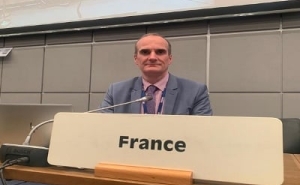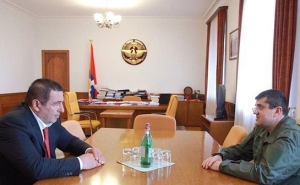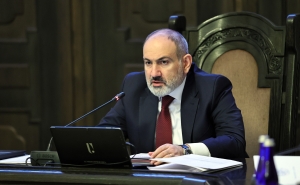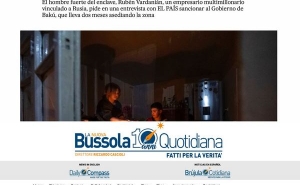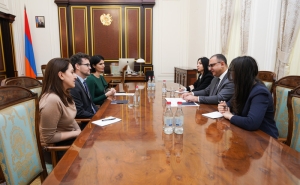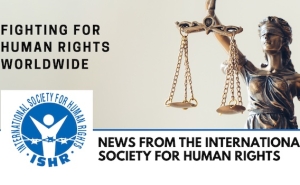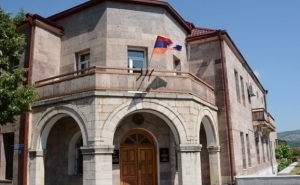Vardanyan gave an interview to the Mirror-Spectator

WATERTOWN — Until recently, Ruben Vardanyan was primarily known to Armenians as a billionaire philanthropist who, having made his money in Russia, was involved in a variety of ambitious projects in Armenia. This all changed when he accepted the position of state minister, equivalent of prime minister, in the Republic of Artsakh around three months ago. Now he has become the loudest voice of the Karabakh Armenians. Vardanyan gave an interview to the Mirror-Spectator on Saturday, January 28 on the Artsakh blockade and his new role.
Not a Stranger
His ties to Artsakh go back several generations, as his grandmother’s mother’s side came from the Hadrut region of Artsakh and emigrated to Tbilisi, Georgia. Vardanyan related, “I went to Artsakh for the first time in 2002. I loved it from the first day.” Since then, he spent a lot of time in Artsakh, visiting somewhere between 8 and 15 times a year, and carrying out various philanthropic projects.
When the 2016 four-day war took place, he said he rushed there immediately from Argentina, while he spent more time in 2020 there due to the 44-day war. This connection evidently was passed down to his children. His son volunteered to serve in the army in Artsakh in 2015-16 when he had a choice between different options, while his older daughter conducted some volunteer work there.
Last year, his youngest son visited him in November and then went away to school, planning to return to Artsakh for the holidays. The blockade prevented that, and Vardanyan said that for the first time, he had to pass the holidays alone without his family.
The 54-year-old, born in Yerevan, moved to Moscow for university studies. He cofounded Troika Dialog there in 1991, turning it into one of Russia’s first and largest investment banks, until it was sold in 2011 to Sberbank for one billion dollars. He served as co-head of Sberbank CIB until 2015, founded several other companies in the same decade and served on many other corporate boards.
Vardanyan said, “First of all people need to realize that together with my wife, we made a decision in 2008 that we will spend most of our wealth in philanthropy and social impact.” He said they told their children from a young age that they will get a certain minimum, less than 10 percent of their total wealth.
Vardanyan cofounded the Moscow Skolkovo School of Management and served on boards of various cultural and educational institutions in Russia and elsewhere. He set up an “ecosystem” of philanthropic, educational and entrepreneurial projects focused largely on Armenia, often with his longtime friend and partner Noubar Afeyan, including the IdeA Foundation (Initiatives for the Development of Armenia), Aurora Humanitarian Initiative, United World Colleges Dilijan College, Revival of Tatev Project, Foundation for Armenian Science and Technology (FAST), and the Future Armenian public initiative. The latter included a pilot project begun in 2022 concerning Artsakh.
Vardanyan said that prior to the blockade he had already spent hundreds of millions of dollars on projects in Armenia and Artsakh and that there were plans for many new projects with other donors. He was going to try to use his own money with a multiplier effect to accelerate these projects. Vardanyan said he spent over $400 million in philanthropy in total, including projects in Armenia and Artsakh, but he said he was prouder of raising one billion dollars for such purposes.
For Artsakh, he said, “I not only planned to spend my own money but also other people’s resources. The question of the blockade changed the issue, but of course we are still planning to help Artsakh as much as we can, and we are doing so now. We are helping a lot.”
The Job
Vardanyan came to Artsakh last August 31 and met the president, Arayik Harutyunyan. He said, “He was very emotional and immediately invited me to become some type of government official.” Vardanyan said that he needed some time to think, as he never thought in his life that he would become a government official. He then traveled around Artsakh to try to understand the situation better and met with many people.
Vardanyan explained that “he offered me the formal state minister position. I am trying at this point to help him manage the situation with other people. I received the formal right to manage the entire government except the military and other security forces.”
After his November 4, 2022 appointment to office, 9 out of 11 cabinet ministers were removed. He said, “Generally, it is normal when you come in as prime minister to replace the cabinet. Secondly, by the way, of the 9 people I asked to leave, two will now be reappointed. It is nothing personal…It is a typical managerial decision.” He said that while most were very professional, some had a different set of skills and approach than what he needed. Nevertheless, he added, half of them will continue to work in various other roles.
There were some discussions with Artsakh’s political elite about possible extraordinary elections, but Vardanyan stated: “I don’t think it really makes sense now to talk about any election when you have a blockade and Azerbaijan putting full pressure to take over Artsakh.”
Vardanyan has been recently visiting various villages in Artsakh in the provinces, such as in Askeran, Martakert and Martuni. He said, “First, when I became prime minister I said that it is my duty to see very village and every place for myself. Second, … from January we started trips to the region to just talk with people to see how they react and what do they respond about the blockade.”
He observed that the people of Artsakh are quite conservative, so the best way to communicate with them is to do it directly. This will help the government also see existing problems and take necessary measures.
The Blockade
When asked about the dimensions of the current blockade of Artsakh and the dangers of eventual starvation, he said, “I think we need to be more precise about what is happening now in Artsakh because there is a little bit of confusion. Yes, we have a blockade, but it is not a blockade like nobody can bring in any food. The International Red Cross and the Russian peacekeepers can bring in food to us.” However, he said, the amount is minimal, as prior to the blockade Artsakh would get 800-1000 trucks a day of resources imported from Armenia, and now it is receiving, according to an estimate by the Azerbaijanis, 400 trucks per month.
“Don’t forget that Artsakh is quite an agricultural country,” he said. Despite the blockade, the people in Artsakh will survive the winter because Artsakh has significant wheat and various grain reserves, and things will get better in the spring, he pointed out.
The limitations on medicaments, food, energy, and operation of infrastructure are significant, but the broader nature of the blockade is most important, he said. “People need to understand that it is not about starving and dying from lack of food, but the pressure to give up your basic right to be independent, self-determining your future, and self-determining your right to live in your own homeland with your own rule of law.” In other words, this is a politically motivated blockade aimed at destroying Artsakh’s ability to continue as a separate self-governing entity.
As part of this pressure, the right of 120,000 people to move freely has been violated, he said, as well as their rights to normal education and many other things. With the entire economy closed down, there can be no production, there is no supply and demand of the markets. People cannot earn their livelihoods.
Among other things, because of the blockade, in December Artsakh was forced to shut down its copper and molybdenum mines, one of the main sources of revenue for the state, after the protests of the Azerbaijani so-called eco-activists. When asked what they were protesting, Vardanyan said simply that “If their demand was truly ecological they would agree to allow international experts to come and check. But they didn’t accept this, because their aim is totally different.”
International Stakeholders
Aside from the “eco-activists” carrying out the blockade, tens of thousands of Azerbaijani and Turkish troops are amassed on the borders of Artsakh and Armenia. When asked whether the Russian peacekeepers in Artsakh are sufficient to ward off potential threats to the local Armenians, Vardanyan replied, “Russia provides peacekeepers which we all know are limited in number – less than 2,000. And they have a very limited mandate to stop the civil activists, whom they call ecologists. The Russian peacekeepers’ role is not fighting against anyone. Their role is to protect the peace and prevent escalations. In the case of aggression, it will be us protecting our homeland.”
Vardanyan said that Russia played an important role in bringing peace to Artsakh in November 2020 when the trilateral ceasefire agreement was signed. As far as how greater involvement of the Western powers in the region might affect the current primary Russian role, Vardanyan said, “To be honest with you, I never heard from the ‘West’ a wish to allocate peacekeepers in Artsakh. But I know how powerful they can be if they impose sanctions on [Azerbaijani President Ilham] Aliyev.” In other words, he continued, “They don’t have a military presence, but they have political influence which they can use to prevent any aggression and force Aliyev to stop the blockade immediately.”
He declared: “I understand that we have a very complicated situation, with a lot of stakeholders with different interests. But I believe that Russia, France and the United States, being co-chairs of the OSCE [Organization for Security and Cooperation in Europe] Minsk Group and knowing the essence of the conflict can come together and exert really strong pressure on Azerbaijan jointly, not separately. I believe that this is an issue where the interests of big countries like the United States, France and Russia are common – to save democracy, to save a small nation whose people have been living on their own land for thousands of years.”
What Can Be Done Now?
Recently, the authorities of the republics of Armenia and Artsakh have expressed divergent views on how to resolve the current crisis and Artsakh’s relations with Azerbaijan. Concerning the role of the Republic of Armenia, Vardanyan declared, “Look, I am not going to say something to you which you do not already know. Usually the Armenian government says that we cannot negotiate on behalf of Artsakh, [meaning] thus Stepanakert needs to talk to Baku directly. We have good working relations [with Armenia] in other areas, like financial, but not about negotiations. We [the Artsakh authorities] have said many times that we are ready to talk with Baku within certain international mechanisms.”
However, direct negotiations between the Artsakh government and Azerbaijan do not seem possible, especially with Vardanyan, who has been disparaged by President Ilham Aliyev. Vardanyan said that some contacts were attempted through Russian peacekeepers. “The president [of Artsakh] met a couple of weeks ago the last time with a representative of Azerbaijan. It was not a negotiation. It was more of a meeting without negotiation,” he said.
Despite all obstacles, Vardanyan feels that there still is a way forward. He said, “The most important is that the story is not over. I think the UN Security Council discussion, France’s position, the United States’ position, [and] Russia’s position, showed clearly that this is not an internal issue for us… Clearly we have a right to raise our voice, to say we have a right to self-determine our future. We have the right to raise this issue, against ethnic cleansing. We have the right to exclaim worldwide that we cannot stay under Azerbaijan state control.”
While some may view repeated statements of international bodies and governments about deblocking the Lachin passageway as moral cover without practical implications, Vardanyan disagreed, stating, “These moral statements work. Azerbaijan will be scared that it will get sanctioned. The Azerbaijani state and elite need to get more pressure to understand that whatever they are doing, they will pay a huge price – and I think it will work. Of course it is not enough, but it is a very important step.”
Moreover, he said, “From my point of view the blockade helped us a lot to explain to the world why we cannot be part of the Azerbaijani state, why we have the right for our own self-determination and will live in our own homeland. We need to make use of this format as much as we can and build the status quo.”
He continued, “I understand that this is not the end solution. Today we need to gain the time to build a longer term strategy to try to find out. We can live side by side, but not under one system [of government] with Azerbaijan.”
Role of Armenian Diaspora
Vardanyan said the role of Armenian communities throughout the world, and in particular in the US and the West, is very important. He said, “We need to keep interest in Artsakh at the right level. We need to continue to pressure all governments that they cannot give up on it because it is too small or irrelevant for them. We need to create pressure about an airlift…We need to also keep the Armenian diaspora’s interest.”
While sending supplies is useful, money is better, he said, especially as there will be a serious government budget deficit this year.
Vardanyan concluded with a message to readers: “Artsakh is one of the last lands which we Armenians hold where Armenians have lived for thousands of years. If we lose this place, it will constitute serious damage to the entire Armenian nation. Amaras, where Mesrob Mashtots started the first school to educate people in the Armenian alphabet, was in Artsakh…It is not only important for the Artsakh people but for everyone who feels Armenian.”
-
 17:08
17:08The regular session of the Anti-corruption Policy Council takes place in Jermuk
-
 15:05
15:05The Prime Minister sends congratulatory messages to the supreme leader of Iran and the President of Iran
-
 11:11
11:11Armenia sends earthquake aid to Turkey
-
 10:43
10:43Commemoration of the Pontiff St. Sahak Partev
-
 09:16
09:16Some roads are closed and difficult to pass in Armenia
-
 19:55
19:55Phone conversation of the Foreign Minister of Armenia with the U.S. Assistant Secretary of State for European and Eurasian Affairs
-
 18:30
18:30Prime Minister Pashinyan and President Khachaturyan meet
-
 18:20
18:20Ararat Mirzoyan with Co-Chairman of the OSCE Minsk Group of France Brice Roquefeuil
-
 17:01
17:01Humans could land on Mars within 10 years, Musk predicts
-
 16:45
16:45France, US urge 'immediate' end to Nagorno Karabakh blockade
-
 16:01
16:01Blockaded Nagorno Karabakh launches fundraiser to support quake-hit Syria
-
 15:59
15:59Earthquake death toll in Turkey rises to 18,342
-
 15:43
15:43Ararat Mirzoyan Held a Telephone Conversation with Sergey Lavrov
-
 15:06
15:06French president rules out fighter jet supplies to Ukraine in near future
-
 14:47
14:475 Day Weather Forecast in Armenia
-
 14:44
14:44President Vahagn Khachaturyan wrote a note in the book of condolences opened in the Embassy of Syria in Armenia
-
 14:20
14:20Azerbaijan’s provocations impede establishment of peace and stability – Armenian FM tells Russian Co-Chair of OSCE MG
-
 12:57
12:57France representation to OSCE: Paris calls on Azerbaijan to restore freedom of movement through Lachin corridor
-
 11:40
11:40Command of Kosovo forces highly appreciated preparation of Armenian peacekeepers
-
 10:16
10:16The United States withdrew from sanctions against Syria for six months the provision of assistance after the earthquake
day
week
month
Humidity: %
Wind: km/h


